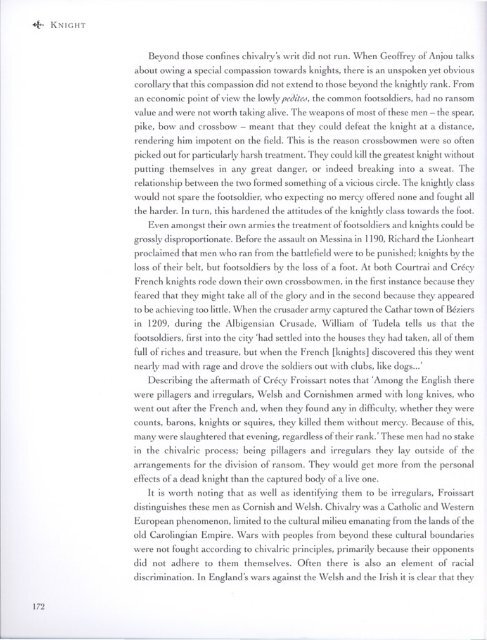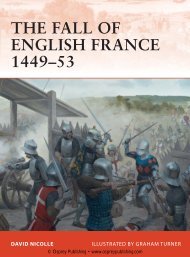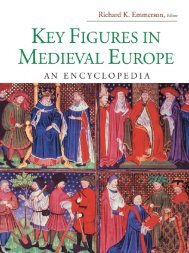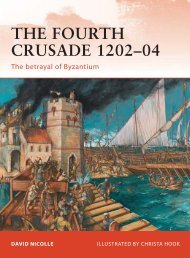Osprey - General Military - Knight - The Warrior and ... - Brego-weard
Osprey - General Military - Knight - The Warrior and ... - Brego-weard
Osprey - General Military - Knight - The Warrior and ... - Brego-weard
You also want an ePaper? Increase the reach of your titles
YUMPU automatically turns print PDFs into web optimized ePapers that Google loves.
Beyond those confines chivalry's writ did not run. When Geoffrey of Anjou talks<br />
about owing a special compassion towards knights, there is an unspoken yet obvious<br />
corollary that this compassion did not extend to those beyond the knightly rank. From<br />
an economic point of view the lowly pedites, the common footsoldiers, had no ransom<br />
value <strong>and</strong> were not worth taking alive. <strong>The</strong> weapons of most of these men - the spear,<br />
pike, bow <strong>and</strong> crossbow - meant that they could defeat the knight at a distance,<br />
rendering him impotent on the field. This is the reason crossbowmen were so often<br />
picked out for particularly harsh treatment. <strong>The</strong>y could kill the greatest knight without<br />
putting themselves in any great danger, or indeed breaking into a sweat. <strong>The</strong><br />
relationship between the two formed something of a vicious circle. <strong>The</strong> knightly class<br />
would not spare the footsoldier, who expecting no mercy offered none <strong>and</strong> fought all<br />
the harder. In turn, this hardened the attitudes of the knightly class towards the foot.<br />
Even amongst their own armies the treatment of footsoldiers <strong>and</strong> knights could be<br />
grossly disproportionate. Before the assault on Messina in 1190, Richard the Lionheart<br />
proclaimed that men who ran from the battlefield were to be punished; knights by the<br />
loss ol their belt, but footsoldiers by the loss of a foot. At both Courtrai <strong>and</strong> Crecy<br />
French knights rode down their own crossbowmen, in the first instance because they<br />
feared that they might take all of the glory <strong>and</strong> in the second because they appeared<br />
to be achieving too little. When the crusader army captured the Cathar town of Beziers<br />
in 1209, during the Albigensian Crusade, William of Tudela tells us that the<br />
footsoldiers, first into the city 'had settled into the houses they had taken, all of them<br />
full of riches <strong>and</strong> treasure, but when the French [knights] discovered this they went<br />
nearly mad with rage <strong>and</strong> drove the soldiers out with clubs, like dogs...'<br />
Describing the aftermath of Crecy Froissart notes that 'Among the English there<br />
were pillagers <strong>and</strong> irregulars, Welsh <strong>and</strong> Cornishmen armed with long knives, who<br />
went out after the French <strong>and</strong>, when they found any in difficulty, whether they were<br />
counts, barons, knights or squires, they killed them without mercy. Because of this,<br />
many were slaughtered that evening, regardless of their rank.' <strong>The</strong>se men had no stake<br />
in the chivalric process; being pillagers <strong>and</strong> irregulars they lay outside of the<br />
arrangements tor the division of ransom. <strong>The</strong>y would get more from the personal<br />
effects ot a dead knight than the captured body of a live one.<br />
It is worth noting that as well as identifying them to be irregulars, Froissart<br />
distinguishes these men as Cornish <strong>and</strong> Welsh. Chivalry was a Catholic <strong>and</strong> Western<br />
European phenomenon, limited to the cultural milieu emanating from the l<strong>and</strong>s ot the<br />
old Carolingian Empire. Wars with peoples from beyond these cultural boundaries<br />
were not tought according to chivalric principles, primarily because their opponents<br />
did not adhere to them themselves. Often there is also an element of racial<br />
discrimination. In Engl<strong>and</strong>'s wars against the Welsh <strong>and</strong> the Irish it is clear that they







